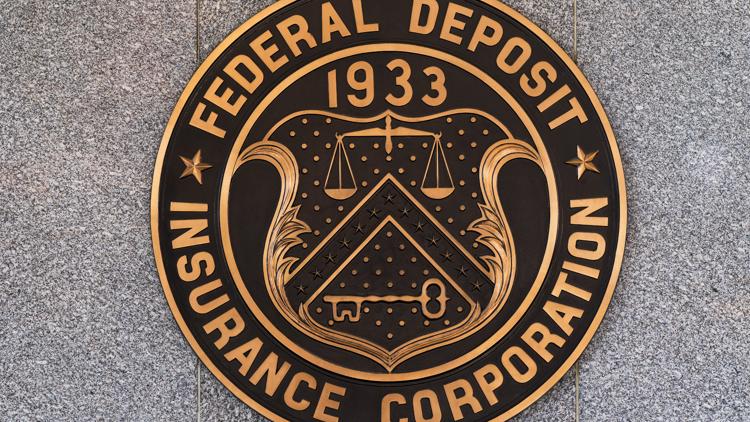Project 2025, the conservative think tank The Heritage Foundation’s plan to transform the federal government during the next conservative administration, is garnering more attention as the 2024 presidential election approaches. VERIFY has received dozens of questions from our readers about the plan and what it entails.
Several social media posts circulating on X and Facebook claim Project 2025 has plans to get rid of the Federal Deposit Insurance Corporation (FDIC). The FDIC protects people against the loss of their deposits up to $250,000 if an insured bank fails in the United States.
“Project 2025 will get rid of the FDIC so your bank accounts are no longer insured, while also deregulating banks so they can take risks that make them more likely to fail. How do you feel about the safety of your life savings being up to banks?” a viral post with over 43,000 shares claims.
Multiple VERIFY readers, including Bobby, Don and Eve, have asked whether these claims are true.
THE QUESTION
Would Project 2025 eliminate the FDIC?
THE SOURCES
- “Mandate for Leadership: The Conservative Promise,” published by The Heritage Foundation, the conservative think tank behind Project 2025
- A Project 2025 spokesperson
- Federal Deposit Insurance Corporation (FDIC)
- Joseph J. Cordes, Ph.D., professor of economics, public policy and public administration, and international affairs and co-director of the GW Regulatory Studies Center at The George Washington University
- Marc Jarsulic, Ph.D., senior fellow and chief economist at the Center for American Progress
THE ANSWER
Project 2025 does not call for the elimination of the FDIC. Instead, it proposes merging the FDIC with other federal banking agencies, but it’s unclear how that merger would impact government-backed deposit insurance.
WHAT WE FOUND
The Heritage Foundation’s “Mandate for Leadership: The Conservative Promise,” the 922-page document commonly known as Project 2025, does not outright propose getting rid of the Federal Deposit Insurance Corporation (FDIC) or government-backed deposit insurance.
Instead, Project 2025 recommends establishing what it calls a “more streamlined bank and supervision” system and says it would support legislation that would merge the FDIC into one entity with other federal banking agencies, such as the Office of the Comptroller of the Currency, the National Credit Union Administration, and the Federal Reserve’s non-monetary supervisory and regulatory functions.
Project 2025, however, does not explain what this would mean for the FDIC’s responsibilities and functions, and it’s unclear if government-backed deposit insurance would be reduced or fully eliminated under this proposed federal banking system. Separate from its recommendations in Project 2025, the Heritage Foundation has previously advocated for completely phasing out deposit insurance.
The FDIC is an independent federal agency created by Congress in 1933 to maintain stability and restore trust in the national banking system after thousands of bank failures occurred during the Great Depression.
The main functions of the FDIC are to insure deposits to at least $250,000 per depositor, per ownership category at each FDIC-insured bank, examine and supervise financial institutions for safety, soundness, and consumer protection, work to make large and complex financial institutions resolvable, and manage receiverships.
While Project 2025 doesn’t address changes to deposit insurance, The Heritage Foundation concluded in a separate 2017 report that “government-provided deposit insurance should be phased out fully” and proposed reducing coverage to around $40,000 per individual in the interim.
“Government-backed deposit insurance weakens market discipline, increases moral hazard, and leads to higher financial risk than would otherwise exist, thus weakening the banking system,” the report said.
Joseph J. Cordes, Ph.D., an economist and co-director of the GW Regulatory Studies Center at The George Washington University, says reducing deposit insurance coverage or phasing it out could potentially lead people to feel less secure with the banking system.
“Deposit insurance is clearly something that maintains confidence in the bank system, and so that even when we have a pandemic, even when we have a great recession, people are not going to make it worse by trying to take their money out of the banking system,” Cordes told VERIFY.
William L. Walton, Stephen Moore, and David R. Burton, the Department of Treasury chapter’s co-authors, write in Project 2025 that “policymakers should create new charters for financial firms that eliminate activity restrictions and reduce regulations in return for straightforward higher equity or risk-retention standards.”
Walton, Moore and Burton say these charters would ultimately replace government regulation with competition and market discipline, which they claim would lower the risk of future financial crises and improve the ability of individuals to create wealth.
Marc Jarsulic, Ph.D., senior fellow and chief economist at the Center for American Progress, a left-leaning independent, nonpartisan policy institute, said in an email that Project 2025 aims to “do away with almost all bank regulation and supervision” from the federal government.
“Doing away with FDIC insurance requirements is consistent with the goal of replacing regulation with ‘market discipline.’ If this part of Project 2025 were enacted, FDIC protection for depositors would end, exposing ordinary Americans [to] financial loss at failing banks,” Jarsulic predicts.



